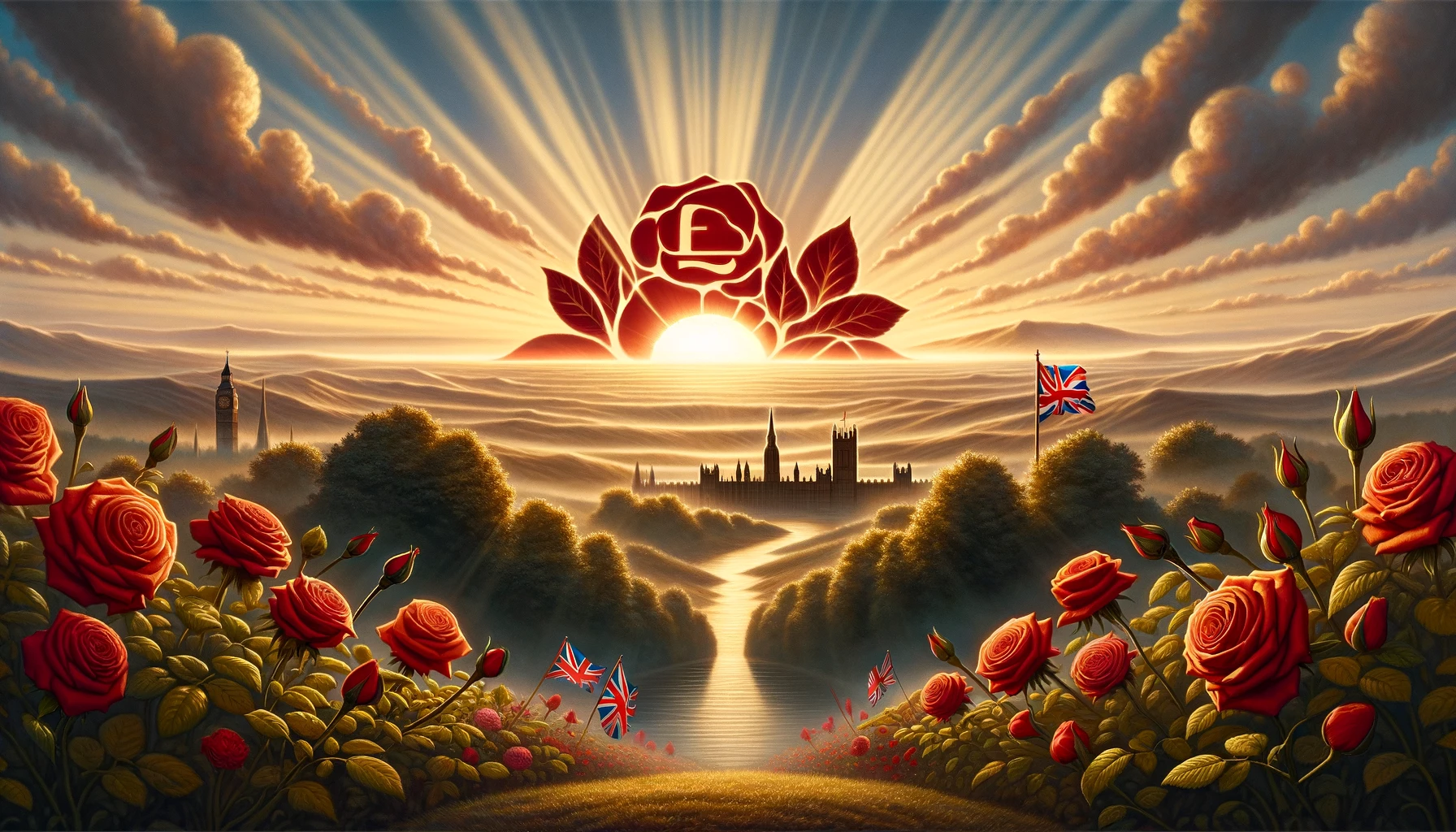Five years ago, the Conservative Party in Britain achieved a major victory in a general election, signaling a potential shift in the country’s political landscape. Fast forward to today, and the situation has drastically changed. The Conservative Party seems to be on the brink of a significant electoral defeat, which would be one of its worst in recent history. This dramatic turnaround highlights the rapid decline of a party that was once celebrated for its dominance.
In the upcoming general election, which has yet to be scheduled, current polls indicate that the Labour Party is likely to come back into power after 14 years in the minority. These polls also suggest that Labour could secure a majority in the House of Commons that might match or even surpass the one they achieved in the 1997 election when Tony Blair became prime minister.
The Conservatives’ downfall can be attributed to a variety of internal issues. After more than a decade in power, the party has become weary and introspective. Similar to the Republican Party in the United States, the Conservatives are plagued by internal divisions, scandals, and a perception among many voters that they are unable to address the nation’s challenges. This perception has been exacerbated by frequent changes in leadership.
Since 2010, there have been five Conservative prime ministers in Britain, with three of them serving in 2022 alone. Liz Truss, one of these prime ministers, held office for only seven weeks, which is a record for the shortest tenure. This instability in leadership has made it difficult for the party to maintain a consistent policy direction.

The division within the Conservative Party mirrors some of the challenges faced by the Republican Party in the U.S., particularly regarding debates about the future of conservatism. However, while the Republicans have rallied around former President Donald Trump, the Conservatives have struggled to maintain unity. As a former British government official noted, the Republican Party has become more aligned with Trump’s ideology, while the Conservatives have tried to adhere to more democratic principles, at least for now.
If the Conservatives suffer a significant defeat, as predicted by some polls, there could be a push within the party toward more extreme right-wing positions, particularly on issues like immigration and Europe. This shift could make the party more similar to the Republican Party under Trump’s influence. However, there is likely to be resistance from within the party, with calls for a return to more traditional conservative values.
The past decade has been tumultuous for British politics, marked by several critical events including a failed Scottish independence referendum, multiple general elections, the Brexit referendum, and the challenges of the pandemic. This period of constant change has left voters feeling tired and disillusioned with politics, a sentiment shared by many in the United States.
The Brexit decision in particular had lasting repercussions for the Conservative Party. David Cameron, who called the referendum expecting a vote to remain in the EU, resigned when the opposite result occurred. His successor, Theresa May, struggled with the party’s internal divisions and the complexities of leaving the EU, ultimately stepping down in 2019.
Boris Johnson followed as prime minister, bringing a mix of charisma and a populist approach to governance. Under his leadership, the Conservatives achieved significant electoral gains, particularly in areas traditionally held by the Labour Party. However, his tenure was marred by scandals, including the “Partygate” scandal where he and his staff violated pandemic lockdown rules. An inquiry in 2023 found that Johnson had misled Parliament about the events.

After Johnson, Liz Truss briefly took over, proposing economic policies that were unpopular and destabilizing. She was quickly replaced by Rishi Sunak, a technocrat who has struggled to convince the public that he can lead a turnaround.
The Conservatives now face the possibility of losing the support of both the working-class voters they gained in 2019 and suburban voters disillusioned with the Labour Party under Jeremy Corbyn. Labour, now led by Keir Starmer, has been moving towards the center, seeking to appeal to a broader range of voters.
Local elections are expected to be a barometer for the Conservatives’ prospects in the general election. If they lose a significant number of seats, it could signal a major defeat in the upcoming general election. The timing of the general election, suggested to possibly coincide with the U.S. elections, could be moved earlier depending on the outcome of the local elections.
The Conservative Party, known for its historical electoral success, now faces a potential long period out of government and an existential crisis about its future direction. Meanwhile, the Republican Party in the U.S. is also anticipating the results of their November elections to determine the future direction of their party.
This article is based on the following article:

Background Information
This background should help readers understand the broader context of the changes and challenges in British politics, as discussed in the article.
1. The UK Political System
The United Kingdom is a constitutional monarchy with a parliamentary democracy. This means that while there is a monarch (currently King Charles III), the actual governance of the country is carried out by elected officials within a parliamentary framework. The main components of the UK government include:
- The Monarch: The ceremonial head of state.
- The House of Commons: The lower house of Parliament, its members (MPs) are elected by the public.
- The House of Lords: The upper house of Parliament, consisting of appointed members, including life peers, bishops, and hereditary peers.
- The Prime Minister: The head of government, typically the leader of the party that has the most seats in the House of Commons.
2. Major Political Parties
- Conservative Party: Often referred to as the Tories, they are one of the two major political parties in the UK, traditionally supporting free market policies and conservative social policies.
- Labour Party: The other major party, traditionally linked with the working class, trade unions, and policies that support social justice and a larger role for the state in the economy.
3. Brexit
Brexit refers to the United Kingdom’s decision to leave the European Union (EU), which was decided by a public referendum in 2016. The term “Brexit” is a portmanteau of “Britain” and “exit.” The process was complex and contentious, impacting UK politics significantly, particularly for the Conservative Party which was deeply divided on the issue.
4. Prime Ministers Mentioned
- David Cameron (Conservative): Prime Minister from 2010 to 2016, who resigned after the Brexit referendum.
- Theresa May (Conservative): Succeeded Cameron and served from 2016 to 2019, struggling with Brexit negotiations.
- Boris Johnson (Conservative): Known for his charismatic and controversial style, he served from 2019 to 2022 and was a key figure in the Brexit campaign.
- Liz Truss (Conservative): Her short tenure in 2022 was marked by economic turmoil.
- Rishi Sunak (Conservative): Current Prime Minister as of the last updates in the article, known for his technocratic approach to governance.
5. Recent Political Events
- General Elections: The UK holds general elections typically every five years, where all 650 seats in the House of Commons are contested.
- Scottish Independence Referendum (2014): Scotland voted on whether to become independent from the UK; the “no” side won.
- Pandemic and “Partygate” Scandal: The government’s handling of the COVID-19 pandemic and subsequent scandals involving government officials breaking lockdown rules affected public trust in the Conservative government.
6. The Role of Public Opinion and Polls
Polls play a significant role in shaping political strategies. They can predict election outcomes, influence party policies, and impact leadership decisions within parties.
7. Local Elections and Their Significance
Local elections in the UK can act as indicators of public sentiment towards the major parties and are often seen as a litmus test for upcoming general elections.

Debate/Essay Questions
- Will Keir Starmer’s leadership and move toward the center be enough to sustain long-term success for the Labour Party?
- What parallels can be drawn between the political situations in the UK and the US, and what lessons can each country learn from the other?
- How can a party strike an ideal balance between widening its appeal to a broader electorate and solidifying its core base?
Please subscribe to Insight Fortnight, our biweekly newsletter!
